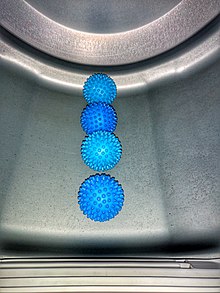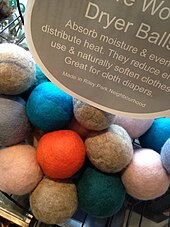Dryer ball: Difference between revisions
Reverted good faith edits by Goadd (talk): Looks like a promo link |
Tag: Reverted |
||
| Line 21: | Line 21: | ||
=== Hypoallergenic === |
=== Hypoallergenic === |
||
Dryer balls are sometimes touted as [[hypoallergenic]]<ref name=":0" /> or better for those with [[sensitive skin]]<ref name=":3" /> as they typically do not apply artificial softening agents or fragrances to clothing.<ref name=":0" /><ref name=":2" /> The [[Environmental Working Group]] says to avoid essential oils used to perfume some wool dryer balls, as some oils are known to cause skin reactions.<ref name=":3" /> |
Dryer balls are sometimes touted as [[hypoallergenic]]<ref name=":0" /> or better for those with [[sensitive skin]]<ref name=":3" /> as they typically do not apply artificial softening agents or fragrances to clothing.<ref name=":0" /><ref name=":2" /> The [[Environmental Working Group]] says to avoid essential oils used to perfume some wool dryer balls, as some oils are known to cause skin reactions.<ref name=":3" /><ref>[https://www.smartsheepdryerballs.com/collections/wool-dryer-balls Wool Dryer Balls], 5 August 2023</ref> |
||
==See also== |
==See also== |
||
Revision as of 23:25, 4 August 2023

A dryer ball is a spherical laundry device for tumbling clothes dryers used as an alternative to fabric softener, reducing static electricity or softening clothing, or to accelerate the drying process.[1][2]
Material composition
Dryer balls are typically manufactured out of felted wool (the original material used for manufacture), rubber, or plastic. Wool variants are typically smooth, while rubber or plastic variants typically include spiked protrusions and may be shaped differently than a sphere.[1][2][3] Rubber and plastic balls are more durable than woolen ones, which need periodic replacement depending on frequency of use.[3]
Mechanism of action
Dryer balls are said to act as a moving buffer, preventing wet laundry from coalescing in the dryer, allowing increased air flow.[3] A study has shown dryer balls mix into the fabric load as it is lifted by the dryer drum, but experience higher speeds than fabrics and decelerate rapidly when tumbling.[4] The material and design of the ball varies its properties: wool balls are said to absorb moisture, accelerating drying.[3][2][5] Conventional fabric softener often gives a fragrance via aroma compound to clothing.[6] While typically unscented by default, wool dryer balls can be used to perfume laundry via application of essential oils to the balls before use.[1][7][5]
Disputed efficacy
The efficacy of plastic dryer balls was disputed by Popular Mechanics who, in 2009, published experiment results in which staff were unable to find any beneficial effects.[8]
Purported benefits

Eco-friendly
Dryer balls are touted to be environmentally friendly for varying reasons versus conventional fabric softeners.[1][3][5] Conventional softeners primarily function chemically, employing quaternary ammonium cation or stearic acid, which is either suspended in liquid or applied to polyester in the case of dryer sheets.[5][6] Dryer balls function mechanically and are reusable,[3] compared to dryer sheets which are typically one-use products.[3][6] Wool dryer balls are typically biodegradable, however can sometimes be chemically altered or bleached, reducing eco-friendliness.[7] The increased drying speeds claimed by using dryer balls helps reduce energy use.[1][7]
Hypoallergenic
Dryer balls are sometimes touted as hypoallergenic[1] or better for those with sensitive skin[5] as they typically do not apply artificial softening agents or fragrances to clothing.[1][3] The Environmental Working Group says to avoid essential oils used to perfume some wool dryer balls, as some oils are known to cause skin reactions.[5][9]
See also
References
- ^ a b c d e f g Bright, Dianne (2019-09-20). "What Are Dryer Balls and How Do They Compare To Dryer Sheets?". Reader's Digest. Retrieved 2021-01-16.
{{cite web}}: CS1 maint: url-status (link) - ^ a b c Casey, Allison (14 Feb 2018). "16 Ways to Save Money in the Laundry Room". US Department of Energy - Energy Saver. Retrieved 2021-01-16.
Wool or rubber dryer balls will help separate your clothes and get more air to them, cutting drying time. They can also reduce static so you don't need dryer sheets (see #7 below). The wool balls are said to absorb some moisture, further cutting drying time. We use these at my house and have seen a noticeable difference in the time it takes our clothes to dry.
{{cite web}}: CS1 maint: url-status (link) - ^ a b c d e f g h "What Do Dryer Balls Do? | Maytag". www.maytag.com. Maytag. 7 Aug 2020. Retrieved 2021-01-17.
{{cite web}}: CS1 maint: url-status (link) - ^ Jones, C. R.; Corona, A.; Amador, C.; Fryer, P. J. (2022-07-15). "Dynamics of fabric and dryer sheet motion in domestic clothes dryers". Drying Technology. 40 (10): 2087–2104. doi:10.1080/07373937.2021.1918706. ISSN 0737-3937.
- ^ a b c d e f Watkins, Julia (2020). Simply living well : a guide to creating a natural, low-waste home. Boston: Houghton Mifflin Harcourt. pp. 104–105. ISBN 978-0-358-20218-9. OCLC 1105149395.
Wool dryer balls are an eco-friendly alternative to fabric softeners and dryer sheets. Not only do they soften your clothes, but they also eliminate static, decrease wrinkling, and reduce drying time by up to 25 percent. They're free to synthetic fragrances, too, although you can certainly add a fresh scent to your clothes by using essential oils.
- ^ a b c Wang, Linda (14 Apr 2008). "Dryer Sheets — The science that gives clothing a soft feel and fresh scent as it prevents static cling". Chemical and Engineering News. 86 (15): 47. ISSN 0009-2347.
- ^ a b c Wellbank, Lauren (6 Nov 2020). "What Are Wool Dryer Balls, and Why Should You Use Them?". Martha Stewart. Retrieved 2021-01-17.
{{cite web}}: CS1 maint: url-status (link) - ^ Sawyers, Harry (23 October 2009). "Do Dryer Balls Work? As Seen on TV Lab Test". Popular Mechanics.
- ^ Wool Dryer Balls, 5 August 2023
